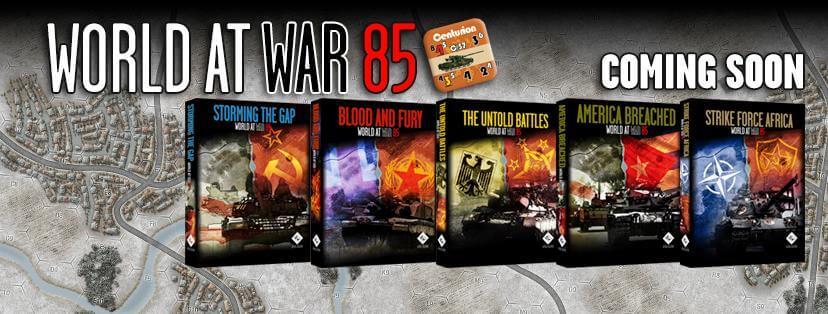Nicolas Michon who is an avid player of WAW 85 has been kind enough to consolidate all of his writing from the WAW85 Facebook page run by Lock N’ Load Publishing so we can all read them! These are snippets of action with a great narrative flair – enjoy.
Scenario 9: Bundeswehr Gegenangriff
Bebra, Federal Republic of Germany, May 30, 1985 – 07:15
Starleit (Lt) Denisov of the 908th Separate Air Assault Battalion had kept himself busy checking over the defenses, to keep his growing sense of unease at bay. This was the fourth time his unit was used in exactly the same fashion, serving as a spearhead for the 95th Tank Regiment. Denisov had served one tour of duty in Afghanistan, and he had seen enough fighting over dusty mountain tops, stifling “green zones” where the enemy would pop out of nowhere out of buried irrigation canals, and even caves, to be worried when operations followed a given routine repeatedly.
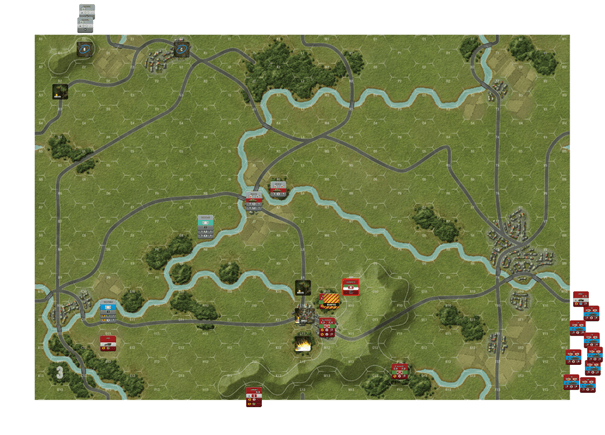
The 908th’s commander, Col. Kossyguine, had shared this concern with the high command, and had suggested a different plan, using first a unit of Spetsnaz posing as refugees and then mounting the 908th on BMPs to secure the river crossings.
But General Gromov, of the 20th Motorized Rifle Division, and his political contacts at Stavka, who backed him up, had insisted upon the need to use “tried and true” tactics, and had even sent heavier equipment (a battery of T-12 115mm AT guns, a platoon of ASU-85, even trucks ….). Denisov thought this made them predictable, and, in his world, predictable did not make you safe. It made you dead.
As he was checking the hastily prepared emplacements for the T-12 guns, he heard a shout from the battery commander, Lt. Karpov, looking through his binoculars: “Over there!”. Looking through his own set, Denisov saw his concerns were fully justified: across, the river, near the town of Cornberg, what looked like two companies of Bundeswehr Panzers and a smaller unit of Panzegrenadier were assembling. This was going to be a long day – or a very short one.
Bebra, Federal Republic of Germany, May 30, 1985, 10:20
Oberleutnant Deck had thrown open the turret hatch of his Leopard I and scanned his surroundings with his binoculars. The air was heavy with the overbearing smell of the still-burning Bebra gas station, in the lower part of the town, barely 200 m behind him, and Deck almost choked on the ashes and pungent smell when outside air got into the crew compartment. His tank, and the rest of his platoon, were at all that remained to defend upper Bebra. The reserves were another platoon of Leopard Is to his right, and that was it.
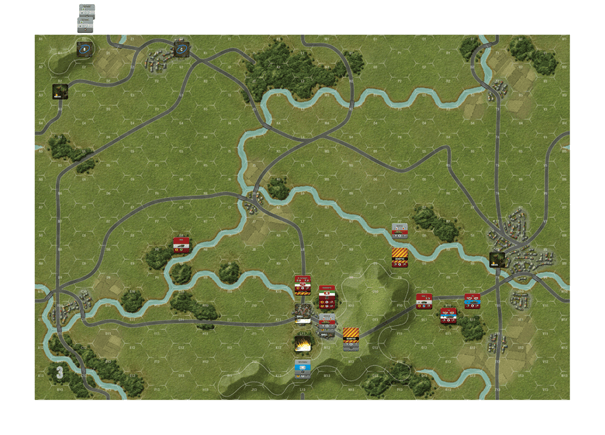
Accurate fire from a half – platoon of T-80’s had killed, maimed or scattered the last of his accompanying infantry from the 62nd Panzergrenadier, and so he and his tankers were getting ready for a deadly game of hide-and-seek with the T-80’s assembling further up the road.
The day had been off to a reasonably good start, as his unit and the Leopard IIs from the 64. Panzerbattalion had clearly surprised the Soviet airborne troops and had pounded the defenses – even poor artillery coordination for the initial strike, and a late start for the Panzergrenadiere which had allow a lucky salvo of Saggers to destroy a full platoon of Marders, had not been enough to throw the counterattack off-track.
But the arrival of a battalion of T-80’s had forced the Germans back on the defensive: The Leopard IIs had given a good account of themselves, destroying at least 15 T-80s before succumbing to a well-orchestrated charge. So, there he was, in his ageing tank, about to face the best the Soviet Union had to offer. Further up the road, the T-80s started advancing cautiously – as well they might, as Deck had ordered his platoon to hold fire as long as possible, since the T-80’s armor was good enough that their 105mm shells had trouble penetrating except at close range.
Ronshausen, a few kilometers East of Bebra, May 30, 1985 – 12:30
Starleit Igor Gambachidze, leaning against his T-80, took another sip from his canteen, without completely removing the taste of ash and petrol, and surveyed his unit, the first battalion, 15th Guards Tank Regiment – all six tanks of it.
A bit further down the road going through the town, the trucks carrying the mostly wounded survivors of the 908th SAAB had parked, and field medics were busy trying to improve on the emergency bandages and slings they had put together back in Bebra.
How ironic that he, the Georgian, the Tchernozopie (Black Arse, a common insult for people from the Caucasus region), was left in command of such an important unit, after three commanders either disappeared “mysteriously” after the failed attempt to capture Nentershausen, and two others were killed on the job, Col. Karpov leading a charge against those beastly German heavy tanks (called Leopard II, apparently), and Captain Antonov trying to wrest control of what was left of Bebra.
After that attempt failed, Gambachidze had rounded up the survivors, and organized the retreat. It emerged after the battle that a “reserve” platoon, hiding in the woods just East of Bebra, had become incapacitated when, in trying to escape a well-aimed salvo of German AT missiles, they had gotten tangled in trees – and saw their engines failed as they tried to extricate themselves. By that point, and given that the 908 th SAAB had ceased to exist as a fighting unit, there was nothing else to do but withdraw.
Surely General Gromov would see that – or maybe not. Gambachidze winced at the memory of the conformist, leaden “inspiring speeches” from the division commander since the beginning of the campaign. His insistence on getting constant reports had actually managed to delay the advance on Bebra by a good ten minutes – maybe enough to change the outcome. He’d never know, and Gromov would not even countenance changing his ways. “Tovaritch Starleit, I have division headquarters on the radio for you! ” said Private Kachiguine, in his usual overly enthusiastic tone. Gambachidze sighed, climbed back into his tank, and prepared to face the music. THE END
Scenario 16: Sleight of hand
BREAK BREAK BREAK BREAK
12. PZD REPORTS HEAVY FIGHTING NEAR WERBACH 1/352 PZ AND 1/362 PZG FULLY ENGAGED. 1/362 PZG REPORTS 40 % CASUALTIES. ENEMY CASUALTIES SIGNIFICANT – ONE SU 22 SHOT DOWN. REQUEST REINFORCEMENTS.
END END END END END END

Scenario 19 : The Rhine
ENCRYPTED COMMUNICATION INCOMING …..
DECRYPTING ….
DATELINE: PARTENHEIM – FRG – JUNE 5, 1985
FROM: COL. TRACTON – TF HEATH – 8th ID
TO: GAL HEATH – 8th ID
CONTACT MADE WITH EGER ELTS – ONE BATTALION REINFORCED MOT RIFLE, ONE BATTALION T-72s
TF FOX BEING OUTFLANKED – OBERHOLM COULD BE LOST –
ARTILLERY SUPPORT EFFECTIVE – ATTACHED TANK COMPANY STILL HOLDING NIEDERHOLM
BUNDESWEHR MOVING TO SUPPORTING POSITIONS – EFFECTIVE AA FIRE ON THEIR PART
INTEL REPORTS FULL SOVIET T80 BATTALION IN APPROACH –
REQUEST AIR SUPPORT – REPEAT – REQUEST AIR SUPPORT
INCOMING TRANSMISSION — DECRYPTING —–
FROM: COL TRACTON, 8/1, 8TH ID
TO: GEN HEATH, CO, 8TH ID
DATELINE: PARTENHEIM – FRG – JUNE, 5, 1985
PACT TROOPS APPEAR TO HAVE STOPPED THEIR ASSAULT AFTER SUSTAINING HEAVY CASUALTIES. WGER RECON UNIT REPORTS EGER INFANTRY DIGGING IMPROVED POSITIONS AROUND NIEDER OLM. PARTENHEIM SECURE. REQUESTING ADDITIONAL ARVS AND MEDEVAC.
TRANSMISSION ENDS
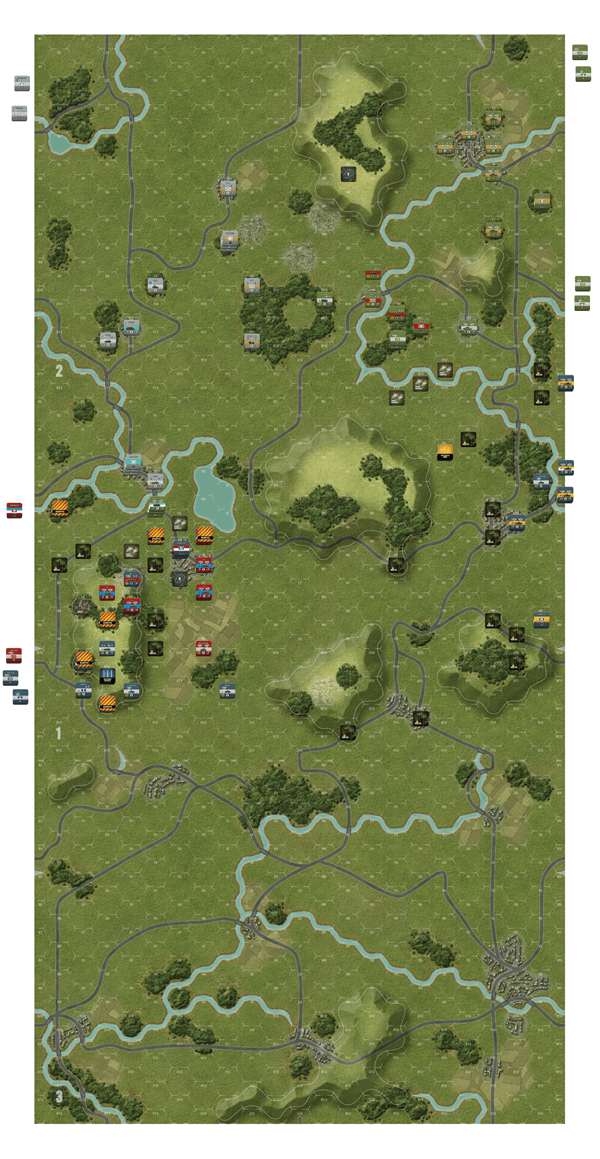
A TALE OF TWO GERMANS – PART ONE (THE RHINE, sc. 19, AAR)
OBER OLM, FEDERAL REPUBLIC OF GERMANY, JUNE 6, 1985
Feldwebel Hans Pahlke sat on the low wall in front of the house he and his T-72 crew had commandeered for the night. If anyone had asked him what his thoughts were, he would have answered, certain that his words would be repeated to the political officer, that he felt ready to go back and finish off the imperialist beast, or something along those lines, now that the 7. Panzerdivision of the Nationalvolksarmee had so brilliantly circumvented the mercenaries of the plutocracy.
His real thoughts, and those of his fellow crewmen, were quite different. First of all, all of the official talk concerning the need to “liberate” the suffering masses behind the Iron Curtain fell flat when even a cursory examination of the towns they zoomed through showed that the oppressed masses of the West lived significantly more comfortable lives than those of mid-level Apparatchiki in the East – the number of cars, and their quality, was staggering, for someone accustomed to the years one needed to wait to receive one’s Trabant (or, if one was well-considered by the powers-that-be, Wartburg).
Second of all, they had been told that they would be facing mercenaries, whose only loyalty was to their chequebook. Resistance had initially been light, as the division took the less travelled roads, but yesterday things had changed brutally, despite the initial success of the Oberstleutnant’s bold plan, featuring the heavy use of smoke. The initial NATO troops facing them had reacted more slowly than they were rumored to, yet still managed to knock a few tanks out of action before being overwhelmed.
A Hind flight supporting them blew up in mid-air when NATO missiles slammed into them. Then, the rain started, which made long range fire difficult for the defenders, but the mud slowed their advance, and especially that of their supporting 2S1 artillery battery. And, as the battalion came closer to its objectives, they were faced with increased resistance, that did not falter even as the T-72s 125mm guns pounded US infantry into the ground.
NATO artillery, long range missile fire and cannon fire from a couple of the new American tanks, which held on despite losing one of their own, gradually whittled down the unit – losing the command tank, then its replacement, certainly did not help. As a tank commander, Pahlke was not even issued with a map, so he did not believe it was his role to take an initiative that could get him killed – or, at best, demoted.
The overall plan featured an assault along another axis by a reinforced battalion of Motorisierte Schützen and a battalion of those new Soviet tanks, but it looks like the “mercenaries” facing them did not give up either, and they also appeared to receive more than their share of artillery fire. Pahlke felt lucky to have been in one of the tanks chosen to take position in the woods, which probably spared him, and his crew, the fate of those on the hill, which did not last long once the rain stopped. Maybe he’d see his native Ribnitz and the DarB again. “Genosse!” [Comrade!] came an unbearably peppy voice to his left, no doubt coming from Schneider, the young, overeager political officer. Pahlke plastered a fake smile on his face, and turned to face the newcomer.
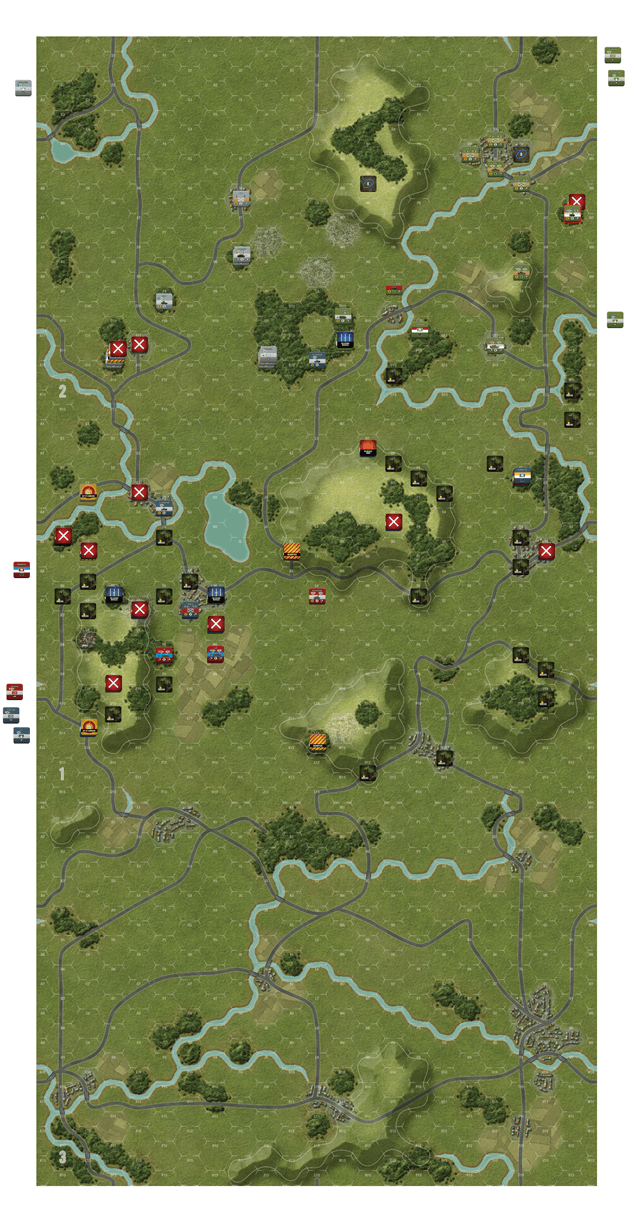
A TALE OF TWO GERMANS – PART 2
Partenheim – FRG – June 5, 1985 – 15:30
“Wiederladen! Schneller!” Oberleutnant Schröder kept the orders short, as the crew, exhausted after weeks of fighting, still adhered to their training. The breech slammed on yet another 120mm APFSDS round, yet another “crack” as the 120mm Rheinmetall sent it at several hundred meters per second towards its target, an unfortunate Soviet tank on a hill about 1,200 m East of their position.
Schröder’s training had not prepared him for the mad rush of the last few weeks, but, judging from the way the other side was doing, neither had theirs. The M60 company – and US artillery, had mauled the “Ashes” (the NVA’s nickname, based of the color of their uniforms), but they had kept coming, soon joined by these new Soviet tanks (T-80’s probably). Schröder and his company were the second line, as they were exhausted after weeks of fighting. Hauptmann Von Bach had moved his platoon and the last one to the small village to the East of his position, and had effectively supported the Americains. Müller, who commanded the other platoon, had managed to lose it in a very ill conceived counterattack, charging the T-80’s without support.
Von Bach and the last Americans had been left alone, and they, the recon unit and even the old Jagdpanzer unit had all joined in the effort, blasting BMPs as they got closer, But artillery, and salvoes of Saggers had slammed repeatedly into their positions. They were not always well aimed but as Stalin once said “Quantity has a quality of its own.” Over on the hill, the T-80 exploded. Müller kept waiting for another one to take its place start firing. But none came. Müller and his crew waited, and waited.
On the battalion net the news came: the other side was withdrawing. The Pact would not cross the Rhine …… not here, anyway.
